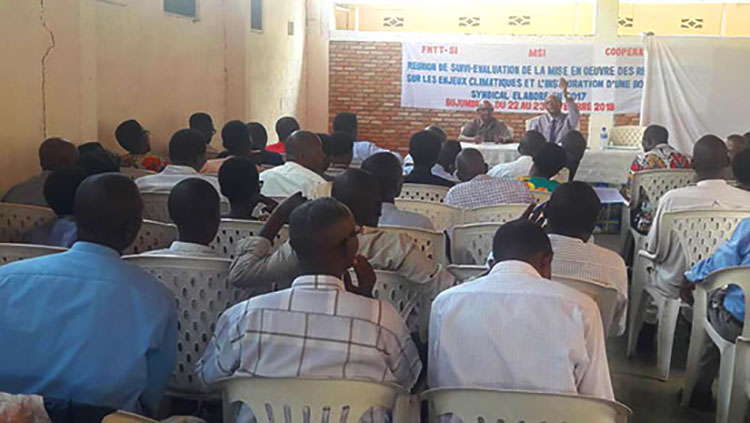By Joris Verschueren, CGSLB International Department
Cyclone Dorian, the floods in South-East-Asia, and even the malaria epidemic in Burundi provoked by rising temperatures harshly remind us that the Global South is hit harder and faster by global warming.
No wonder that, while the global trade union movement gears up for a just transition, unions from the South seem more acutely aware of climate change and its devastating effects on workers’ livelihoods. Their action plans reflect the shift from long-standing worker’s focus on health and safety at the workplace and the working environment towards a broader concern with the effects of climate change and mitigation on working conditions, employment, income (losses) and worker’s dependence on their natural environment.
In october 2018, with the assistance from the CGSLB Belgium and the solidarity support organisation MIS, Burundi’s two trade unions COSYBU and CSB decided to outline a joint environmental strategy, under the 2017-2021 partnership programme. The strategy was adopted in early 2019.
Burundi is a very rural society, with 90% of the workforce located in the informal economy. The overwhelming majority is unmistakably dependent on ecosystem services - think not only of farmers, but also brickmaking and other construction trades, carpentry, charcoal burning, food processing etc.
The uniqueness in this strategy lies not only in the fact that it is an inter-union cooperation from the outset, but also in the broadness of its contents. It integrates already existing policies on health and safety, more specifically on pollutants, sets up a series of awareness-raising and lobbying-activities, and provides for training measures for members. The strategy equally integrates elements of the very recent International Labour Organisation (ILO) Decent Work for Peace and Resilience Recommendation (R205, 2017).
Moreover, both COSYBU and CSB intend to update their bylaws at their next congress, so as to explicitly mandate themselves to take up environmental challenges and extend their action in this field. Specifically, both trade unions resolved to use their position in its governing bodies to seek ways to open up Burundi’s (albeit fragile) social protection system to those suffering income losses as a result of climate change or adaptation to it. While this is in line with the positions of the ILO and the International Trade Union Confederation, it serves to show that unions in Burundi are preparing themselves for a future in which climate change will increasingly alter the world we live and work in.


